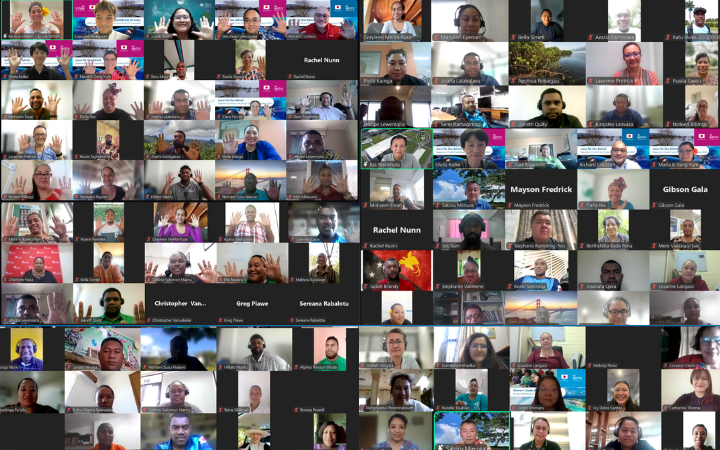the "Leave No One Behind: Rapid Response to Climate Crises through Early Warning Systems" programme concluded its first phase with a final webinar.
9 October 2024, Hiroshima, Japan - UNITAR wrapped up the first phase of the "Leave No One Behind: Rapid Response to Climate Crises through Early Warning Systems" training programme with the fourth and final virtual classroom on 24 September. For two months, over 200 enthusiastic officials and professionals from 16 Pacific Island countries explored risk assessment, tools, knowledge, and technologies in early warning systems (EWS) through asynchronous online learning.
The top 30 performers from the first phase will progress to the next phase, which will be an in-person workshop and study tour in Japan from 11 to 22 November. With mentoring support from specialists in early warning systems and group work, the participants will fine-tune their individual plans to effectively coach their community members on the early warning system. At the end of Phase 2, the participants will make final pitches. They will be recognized as "Shimanami Masterminds", indicating that they were top performers in the overall programme, and receive completion certificates.
The programme, funded by the Government and People of Japan, aims to enhance resilience in the Pacific and empower people at risk to take timely and responsive actions to minimize risks and impacts of climate-related hazards.
PHASE 1: DEEPENING AN UNDERSTANDING OF EARLY WARNING SYSTEMS
In Phase 1 of the programme, the participants deepened their understanding of early warning systems, effective collaboration and timely communications through asynchronous online learning via the EdApp platform and four live virtual classrooms.
The inaugural webinar on 23 July welcomed the agents of change from Pacific Island countries and provided them with an overview of the programme. The participants enjoyed the networking opportunities through interactive breakout-room discussions.
On 6 August, the participants reconvened for the second webinar. The virtual classroom featured specialists in disaster risk reduction and early warning systems Mr. Ven Paolo B. Valenzuela and Mr. Daniel Roger, who spoke about climate change and its impact on peace and security. Following their talks, the participants engaged in thought-provoking discussions with the lecturers.
The third webinar, held on 10 September, focused on disaster waste management and early warning systems for floods. The speakers for this session included Prof. Kei Yoshimura from the University of Tokyo and Mr. Satoru Mimura from the Japan International Cooperation Agency (JICA). To strengthen regional networks and collaboration, UNITAR also introduced a new online community, "Prosperity Unlimited". The community hosts discussion spaces and resources to foster collaboration among participants and disseminate news and information from the programme.
The fourth and final webinar was held on 24 September. Ms Judith Giblin from the Secretariat of the Pacific Community and Ms Patricia Mallam of the Secretariat of the Pacific Regional Environment Programme delivered lectures on ocean and coastal risk and disaster risks among vulnerable groups of people. UNITAR also congratulated all participants.
Congratulations on going through the programme with us. We are grateful for your efforts. We'll bring what we have learned in the online content as well as our experience in Japan and try to create early warning systems for all using the context of Pacific Island countries." - Richard Crichton, EWS Programme Lead, Samoa.
ABOUT THE EARLY WARNING SYSTEMS TRAINING PROGRAMME
"Leave No One Behind: Rapid Response to Climate Crises through Early Warning Systems" training programme aims to equip individuals and communities in Pacific Island countries with the knowledge and skills to effectively disseminate, monitor, analyse and respond to early warning signals for climate hazards and extreme weather events. Ultimately, the programme will help save lives and reduce the negative social and economic impact of climate-related hazards.
The programme is part of the UNITAR Shimanami Collective initiative, which comprises a series of training programmes to build resilience against disasters and enhance sea and human security in the Asia-Pacific, with a special focus on empowering youth and women. Financially supported by the Government and the People of Japan, the Shimanami Collective initiative consists of specialized training in three areas: sea and human security, early warning systems, and women's leadership in disaster risk reduction.







